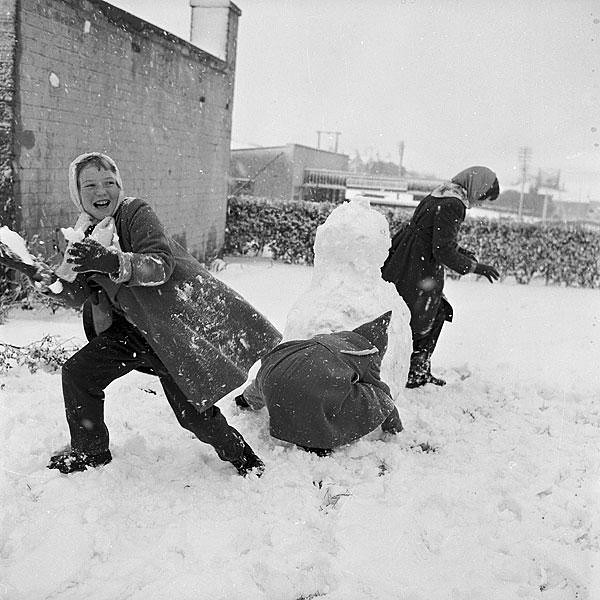"It was an immense discovery, pounding into my hot head with every sliding, joyous step, that this ordinary adult evidently knew what I thought only children who trained at football knew: that you have to fling yourself at what you're doing, you have to point yourself, forget yourself, aim, dive." (47)
Re-typing Dillard's line immediately put this song in my head. It was this moment in An American Childhood that convinced me I really liked the book. She's describing being chased through the 1950s Pittsburgh after hitting the windshield of a black Buick with a soft snowball, "right before the driver's face". Her anecdote contains none of the conventional judgment you might expect: We should have been more careful, or, perhaps more satisfying, It felt good to be bad.
The driver chases Dillard and her friend, Mikey, "silently over picket fences, through thorny hedges, between houses, around garbage cans, and across streets". He never quits.
He catches them, but it doesn't really matter. All he can say is, "You stupid kids".
The chase was the thing, the process. "The point was that he had chased us passionately without giving up, and so he had caught us. Now he came down to earth. I wanted the glory to last forever".
P.S. Another favorite line from later in the book. Dillard describes her teenage encounter with Giacometti's "Man Walking". "Artists, for their part, noticed the things that engaged the mind's private and idiosyncratic interior, that area where the life of the senses mingles with the life of the spirit: the shattering of life into color, and the way it shades off a round bend. The humble attention painters gave to the shadow of a stalk, or the reflected sheen under a chin, or the lapping layers of long strokes, included and extended the scientists' vision of each least thing as unendingly interesting. But artists laid down the vision in the form of beauty bare—Man Walking—radiant and fierce, inexplicable, and without the math" (213).



I like the quote about the Artists extending "the Scientists' vision of each thing as unendingly interesting."
ReplyDeleteWhen a Scientist sees a Thing of interest, he asks "Why?" What does an Artist ask of a Thing? Or, does the Artist not ask anything and merely lets the Thing pass through the black-box subconscious transformation of his or her mind?
Yeah, me too. It's from a section where she kind of has a sea-change. During childhood, she was obsessed with collecting and labeling things, looking through microscopes, and the chapter describes how that expanded for her. I think most artists tend to ask "how" more than "why" and it's all the answers to that question that end up in the finished work, but I think the main difference is the processing of the question. Artists don't expect a definitive answer, but enact possible answers to questions through some kind of narrative and try to get the audience to really sit with the ambiguity. Scientists seek conditional answers and try to put them to work. Those are my thoughts at present, open to amendment, of course.
Delete